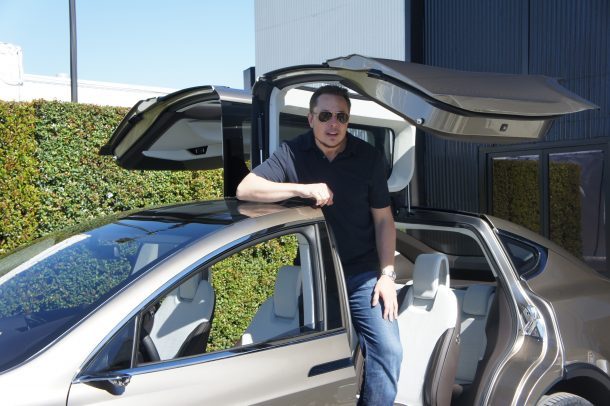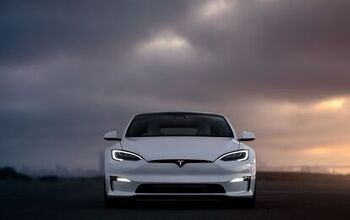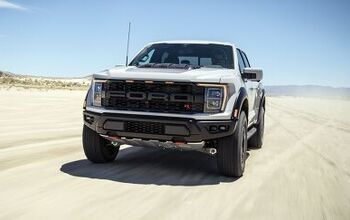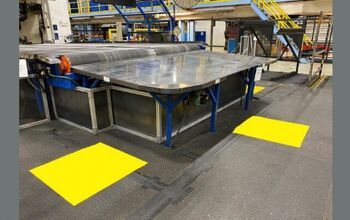One More Media Take On Elon Musk's Media Meltdown

Oh, Elon. Elon, Elon, Elon.
As you, the reader, no doubt know, Tesla CEO Elon Musk has been blasting the media – and financial analysts – for being critical of his company and/or its products. He was too annoyed to even answer questions from analysts during one recent earnings call – turning attention instead to a YouTube user who happens to be a Tesla investor and apparent fanboy. Musk gave him the floor for over 20 minutes.
Musk’s meltdown has continued since. Last week he stirred up shit on Twitter by suggesting that the media is lying and that he’ll create a media-rating service. He also may or may not have blown an anti-Semitic dog whistle (I don’t think that was his intent, but I can see why it was taken that way – especially given some of the nasty stuff that’s taken place on Twitter since, oh, lo about mid-2015 or so) in the process.
That’s just the short version.
There’s so much to unpack here – so much that I sat staring at a blank Word doc for 10 minutes, got up and paced around my place, sat down, stared some more, surfed the web a bit, and finally came back, still not knowing where to start.
I guess let’s start with the obvious, with the main conclusion that I formed a few days ago and that The Atlantic and others have also hit upon ( twice, in The Atlantic’s case) – Elon Musk either doesn’t understand, or doesn’t care about, how basic journalism works.
Put simply, journalists are not paid to promote Tesla or any other company. We work for our readers/listeners/audience, and we’re not here to cheerlead. That’s what a company’s PR department exists for. This also applies to analysts. They’re in search of the truth as well, albeit for a different audience – corporate clients or investors instead of the general public. There’s an overlap in skill set between journalists and analysts for a reason.
Some of us are charged with investigating corporate misbehavior or malfeasance. That’s why Reveal found that Tesla’s plant in California appeared to be an unsafe place to work.
Other journos are tasked with reporting any and all news relating to Tesla, whether it’s positive or negative from the company’s point of view. Others are asked to review the cars the company builds, and in the interest of serving car buyers, to be honest about what they find – again, regardless of whether it makes Tesla look good or bad.
It’s not that complicated. But whether because of thin skin, a desire to deflect attention away from his company’s failings and change the conversation to “Musk vs. the media,” a lack of understanding in what journalism’s role in society is, or a combination of all three, Musk has made it about himself and his reaction to media criticism. Not the cars.
Let’s start with Musk’s complaint that Tesla crashes make news and other car-related deaths don’t. First, that’s wrong – the media has reported on car-crash deaths extensively. Not just at the national level, but local news broadcasts always seem to mention a wreck or two. Second, and more to the point – when an Autopilot-equipped Tesla crashes, it makes news because the technology is new and relatively unproven. Musk or his fans often say the media is killing people by discouraging the development of autonomous cars, but I’d flip that around – if the misuse of the tech by misinformed drivers leads to fatal crashes, isn’t the tech already killing people? Not to mention that while it’s logical to assert that self-driving cars could someday reduce or eliminate car-related deaths, it’s not yet a given.
A couple weeks after that, Musk went crazy on Twitter following a piece from pro-Tesla site Electrek that quoted an analyst who dismissed concerns over negative headlines. Meanwhile, the Model 3 initially fell short of Consumer Reports’ coveted “Recommended” rating, thanks in part to a long stopping distance. The Model 3 did eventually earn the rating after another test, following over-the-air updates to the car.
Maybe it’s from all that sleeping on the factory floor, or the stress from not being able to meet promised production deadlines (sorry, Elon, but we warned you: Building cars and selling them in mass quantities is freakin’ hard), but Musk went deep into tweetstorm city.
What Musk is doing is classic deflection and discrediting – straight from the playbook of you-know-who. And it works, to an extent, because the media, like any human-run institution, occasionally has failures. Some are honest mistakes (remember the misidentification of the Boston Marathon bomber by a newspaper prioritizing speed over accuracy?) and some are scandals caused by the doings of high-profile journalists (see: Williams, Brian or Blair, Jayson). Failures of both kinds hurt the credibility of all of us, because outsiders like to paint with a broad brush. This applies to all professions, of course – we’ve all stereotyped lawyers as shady and sleazy when only a small percentage are.
One of the first things you learn in J-school is how important credibility is, and one of the second things you learn is how easy it is for it to be lost – sometimes through the actions of other journalists and no fault of your own. People like Musk know it’s easy to pick apart the credibility of those of us who report honestly on Tesla – he can look at high-profile examples of journalistic malfeasance or mistakes and say “see?!”
I know someone who lives on the other coast who also does the same thing.
Add in hyper-partisan media on both sides of the aisle (some of those outlets play quite loose with facts) and actual “fake news” hoaxes (ahem, Pizzagate), plus the fact that most of us probably didn’t sit through a journalism 101 class growing up, and you have a media consumer that can easily be led to believe that the media is lying or beholden to powerful anti-Tesla (or anti-EV) corporate interests, when in fact all the media is doing is reporting truthfully on Tesla. It just happens to be a truth Musk doesn’t like, one that could even hurt the bottom line, so instead of looking inward, as he should, Musk lashes out.
Finally, Musk is unique among big-name business figures in that he’s built a cult-like following, at least among a percentage of his supporters (just like – yeah, you get it). Some of these people are automatically going to take his word over the verifiable and objective facts, and that’s that. I don’t see Mary Barra or Sergio Marchionne getting the same treatment any time soon.
I should note here that despite my oblique references to the current resident of 1600 Pennsylvania in D.C., I don’t fully agree with Bret Stephens’ assertion in the paper of record that Musk is Silicon Valley’s Trump. Stephens has some fair and accurate points, but he also misses the mark on some, as explained here. More to the point, his thesis is a bit of an oversimplification – Musk and Donny J. may react to negative press coverage the same way (Trump has even said that he attempts to discredit the press in order to get his supporters to believe him), but there are huge differences between the two.
One thing that is the same, though, is that both men used the same press they vilify to reach their current positions. The press gave Trump’s campaign a lot of coverage, not because it wanted him to win, but because the campaign had a carnival atmosphere, and that coverage may have helped him win. Similarly, Musk and Tesla have gotten a lot of positive press over the years, and that probably hasn’t hurt Tesla’s attempts to sell cars.
Thing is, and I’ve said this before, a lot of us in this industry actually want to see Tesla succeed. That doesn’t mean we’ll cheerlead for the company or hold back on reporting negative news – we have to do our jobs. But reporting truths that happen to be negative or being honest about a car’s failings isn’t the same as rooting for failure/against success. This applies to other parts of the journalism world, as the current sports editor of the college newspaper I once toiled for explains here, in reference to my alma mater’s failures on the hardwood.
I assure you, Elon, if you’re reading this, that I don’t hate your company. I am not being paid under the table by other automakers or Big Oil to write negatively about Tesla. Nor am I under some corporate mandate to be mean to Tesla. I just am obligated to report on your company honestly. So is my staff and most of the other journalists covering Tesla (I concede there could be a journo or two with a hidden agenda, but the only one I’ve seen so far is actually probably on your side).
Also, dude, you don’t need to create a site to rate the media. It’s not because we can’t take the heat (although I suspect crowd-sourcing it will lead to a lot of inaccuracies. Irony!) but because Snopes and Politifact already exist, and while their primary objective isn’t to rate media accuracy, they do so when warranted. Sorry, that “need” has been filled already.
Elon, we in the media aren’t afraid to have our credibility rated by a third-party site, but we are concerned that a site like your planned “Pravda” could be misused to create more misinformation, or to unfairly impugn the credibility of legitimate outlets that are doing honest work. All it takes is an army of trolls to downvote a credible story that they don’t like, and just like that, more misinformation has been spread.
Mr. Musk, let me school you on two more aspects of journalism. You’re actually partly right when you say that we are under pressure to get clicks. Just how TV news needs ratings, or newspapers need a combination of newsstand sales/advertising/subscriptions. Why, it’s almost as if most of the media is a for-profit business!
Except for Reveal, which is a non-profit. Guess not everyone out there is looking to profit off Tesla’s faults.
Sarcasm aside, just because we need clicks doesn’t mean we do sloppy work, push an agenda, or play loose with facts. Quality journalism and the need to have an audience read our work isn’t mutually exclusive. You can have a snappy headline that gets clicks that is also factually accurate and refers to a true story. You can work to get clicks and remain objective and unbiased. Furthermore, there’s a separation between advertising and editorial at any outlet worth its salt.
Second, while you’re correct in saying that most media outlets are corporate owned, most journalists and editors aren’t beholden to report what the owner wants – editorial and ownership rarely interact. A basic truth of journalism is that editors and reporters are usually not interfered with from above. Sure, we at TTAC have occasionally been asked to run some (clearly marked) advertorial content, and our bosses may give us some very general, very broad guidance on the site’s direction and tone, but generally speaking, we’re on our own to find the content mix that works best for our true masters – the readers. And that’s how it is at virtually every trustworthy media outlet.
I suppose maybe you’re confused because there are some outlets that have been criticized for too much corporate control over editorial? That can happen – there are exceptions to every rule. Google “Sheldon Adelson” and “Las Vegas Review-Journal” sometime. Or Fox News. Or Breitbart. Then remember that those outlets are outliers.
Oh yeah, another thing – stop using sites run by (alleged) sex cults to back up your points.
Look, Elon, if you want good press, build good cars, and take accountability when you fall short. It’s not that hard.
And maybe delete your account. At least for a bit. You can always come back – perhaps once you hit the next production deadline.

Tim Healey grew up around the auto-parts business and has always had a love for cars — his parents joke his first word was “‘Vette”. Despite this, he wanted to pursue a career in sports writing but he ended up falling semi-accidentally into the automotive-journalism industry, first at Consumer Guide Automotive and later at Web2Carz.com. He also worked as an industry analyst at Mintel Group and freelanced for About.com, CarFax, Vehix.com, High Gear Media, Torque News, FutureCar.com, Cars.com, among others, and of course Vertical Scope sites such as AutoGuide.com, Off-Road.com, and HybridCars.com. He’s an urbanite and as such, doesn’t need a daily driver, but if he had one, it would be compact, sporty, and have a manual transmission.
More by Tim Healey
Latest Car Reviews
Read moreLatest Product Reviews
Read moreRecent Comments
- 3SpeedAutomatic Nope....
- Bd2 Looking forward to flooding the rental lots with Hyundai and Kia models, this is just one obstacle now eliminated.
- Kcflyer keep the color. lose the stupid front design. make it reliable, at least as reliable as a base 911. Then and only then is it somewhat worthy of that price.
- FreedMike I'm not sure why anyone would choose this over an A8 or S-class.
- FreedMike I think the manufacturers who are discontinuing affordable small and midsize cars in favor of more expensive crossovers (that are built on the same platforms and use the same mechanicals as said small and midsize cars) may well live to rue that decision. Having said that, though, at least GM is offering decent entry level stuff beyond the Malibu, so good for them.




































Comments
Join the conversation
Well, at least it's just the CEO of an indie automaker who believes the press only exists to promote his product and policies, and that anyone who crosses him are lying traitors. Imagine if the country was run by someone like that! XD
This is an excellent article. I wouldn't say that historically (or even recently) TTAC's coverage of Tesla has been completely objective, though; while factual, in tone it has displayed an unmistakable schadenfreude. That isn't surprising or even inappropriate though: this site isn't an objective newspaper, it's a fan blog for an industry that is feeling threatened and defensive in the face of changes exemplified by Musk and Tesla. I figure it evens out the cheerleading from other blogs e.g. Elektrek. Speaking of which. Any good journalist knows to follow the money, and in evaluating possible conflicts of interest, any news consumer can do the same. Elektrek has something to gain from Tesla's success: referral dollars and Tesla stock value for the site's operators. TTAC has something to gain by Tesla's troubles: a better competitive position for other automakers who unlike Tesla advertise on TTAC. This sort of thing should never affect coverage in a perfect world, but not all owners are equally hands-off, and not all bias is conscious.